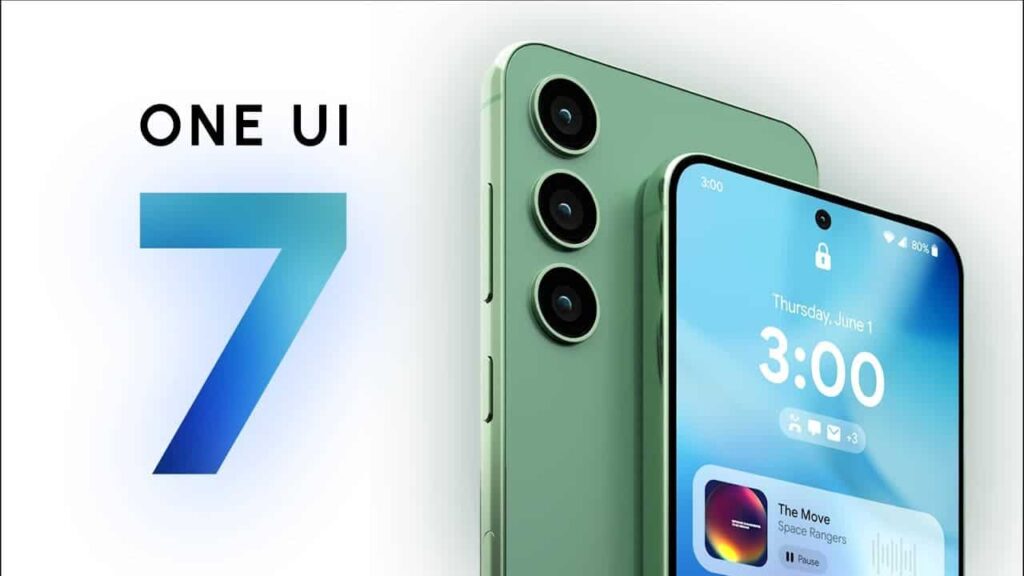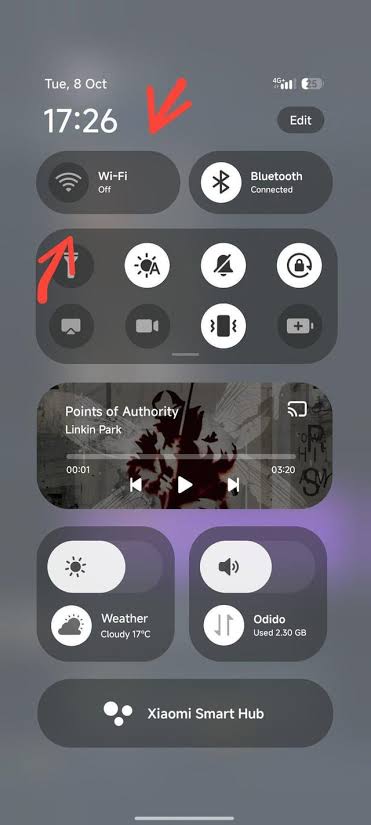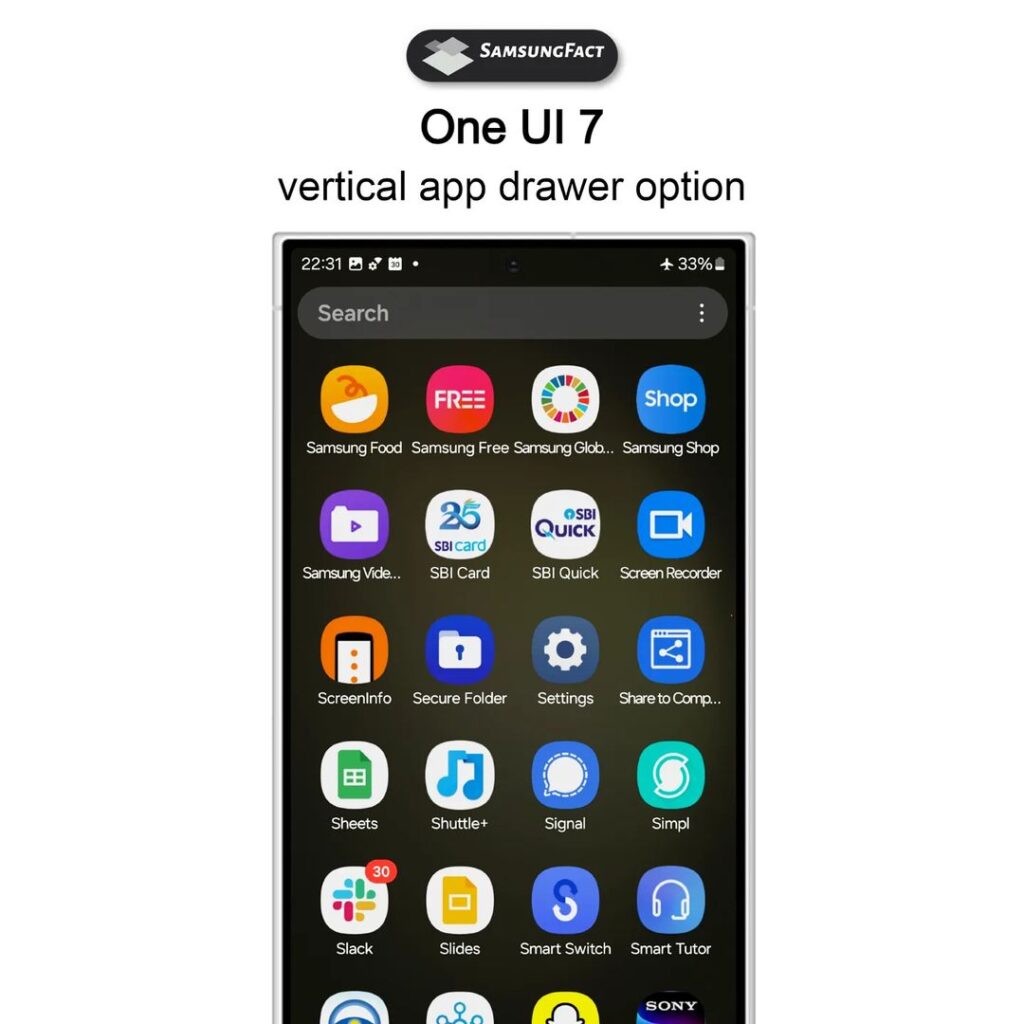
All new features of oneUi 07
Table of Contents
Toggle1. Redesigned Stock Icons
According to a leak, the default set of icons in One UI will see a redesign. They will feature more rounded iconography with distinct shades of colors that will make it easy for you to tell them apart.
These new icons look refreshing from the current ones that we have grown used to. The change will be more prominent for Camera, Gallery, Settings, and Samsung Internet.
2. Bold View for Apps
Another feature taken right from iOS 18 is the bold view for app icons. Picking this option from Settings will expand the icon size and hide the app names. You can go back to the normal view with labels by selecting the Classic option.
3. New Quick Settings Panel

4. Split Notifications Tray
In another move to blur the differences between Android and iOS, Samsung will be bringing a new option to show notifications on a separate page from quick settings. I imagine that you will have to pull down from the left side to show notifications and the right to bring up quick settings. You can, of course, show them in a typical merged view if you prefer that.
5. Dynamic Island Style Notifications
In a small video shared by Smartprix, we see another element taken from iOS that works like the Dynamic Island. You’ll see a small pill-shaped notification on the left side of the status bar, which you can long press to expand. OnePlus implemented this feature already with the Oxygen OS 14 update, so we might see more Android OEMs adopting it soon
6. Pill Shaped Battery Icon
While the status bar didn’t see any major changes, the battery indicator did get the rounded treatment like the rest of the One UI 7 interface. It has a pill-shaped design, with the battery percentage showing in side

7. Smoother UI Animations
Samsung will come with faster, more responsive app opening and closing animations. They have added interruptible animati icons in case you decide to close the app midway as it opens. Some new page return animations for the back gesture coming with Android 15 are also going to be available. This will go a long way to offer a more polished user experience.From the recent menu to app opening and closing animations, and per-app animations, there are a lot of changes that are currently being tested. The look and feel of the UI certainly seem to be the priority in One UI 7.
8. App Lock
App lock is one of those features that is a must if you don’t want others to snoop around your phone when you hand your phone to them. Going by an X post, we should get to see a basic implementation of it in One UI 7.0.I suppose it should let you lock apps using a passcode, password, or pattern with an option to unlock them with biometrics. It is still unknown whether Samsung will adopt the privacy space feature that is coming with Android 15.

9. Live Activities on Lock Screen
Samsung will be adapting Live activities from iOS for the lock screen on One UI 7. The feature will be called the Control area, but it will work somewhat similar to Live activities. You will be able to track the progress of an ongoing song or your Uber ride. You can long-press it to expand and show more details if you want to.
10. Change Lock Screen Shortcuts
Given the emphasis on customization in One UI, it always bothered me that we couldn’t change the left and right lock screen shortcuts. Not without a Good Lock module, at least. But with the upcoming update, you will be able to add any shortcut that you want to quickly jump into from the lock screen. This is a great accessibility feature, and I am glad Samsung is finally adding it.
11. More Resizable WidgetsL
astly, we should get to see some new widgets both for the home and the lock screen with more resizable options. Currently, there are only a few widgets that you can add on the lock screen, so some new ones are surely going to be welcomed.
12. Cross Device Continuity
Samsung is the only Android manufacturer to create its own ecosystem. However, it has not been able to take advantage of it in any significant manner like Apple. This will change with Continuity notifications which will let you send notifications, incoming calls, or video calls to other Galaxy smartphones and devices signed in with the same Samsung account.

13. New Layout for Camera App
The camera icon isn’t the only thing that has received a redesign. One UI 7 also updates the layout of the camera app, bringing controls and all other options to the bottom section of the app. Options like flash, aspect ratio, timer, and settings, which used to be at the top, have now been shifted right above the camera shutter button Placing all the different camera modes like Portrait, Video, and Night Mode below the shutter. It leaves the top portion of the UI empty while making the options Samsung’s AR emoji is being replaced by Galaxy Avatar. The page hosts a Sync with Samsung Cloud option followed by Avatar Stickers and Avatar Camera.
There are also Design new clothes, Profile, and Create an Avatar video options that are all grayed out, probably because the Sync with Samsung Cloud toggle is turned off.
14. There are a few new upcoming widgets
an iOS-like frosted blur going for them. In the image shared by on, you can see a new Internet widget that shows you the amount of time spent on the Internet and the time remaining. The frosted blur looks quite good and feels heavily inspired by iOS.